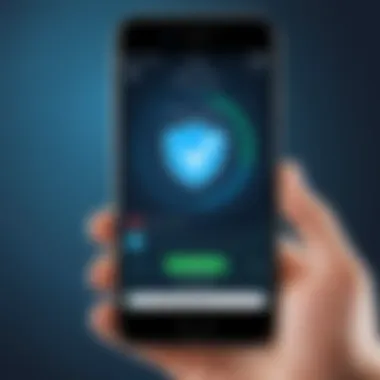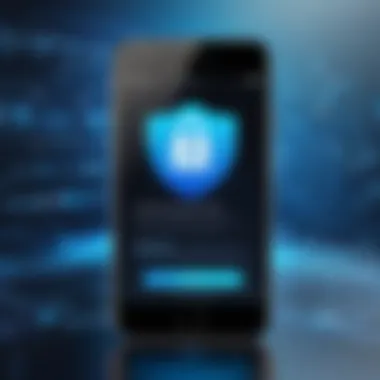Assessing VPN Safety on iPhone: Key Considerations


Intro
In an age where digital privacy is a growing concern, understanding the safety of Virtual Private Networks (VPNs) on iPhone devices has become essential. iPhones are widely regarded for their security features, yet users are often uncertain about how VPNs fit into the overall security landscape. VPNs are meant to conceal users’ online activities and protect their data from potential attackers. Yet, not all VPNs deliver the same level of protection or privacy, particularly on mobile platforms like iPhone.
This article aims to disentangle the complex web surrounding VPN usage on iPhones. By investigating the core principles of VPN technology, the current security challenges faced by users, and the implications of various VPN service providers, we provide essential guidance for informed decision-making.
Throughout this discussion, we will engage with user experiences and expert opinions, establishing a framework for recognizing what constitutes a safe VPN service for those who rely on iPhones. The goal is to foster understanding about privacy, data protection, and the potential vulnerabilities inherent in VPN applications.
Understanding VPN Technology
Understanding VPN technology is crucial for assessing the safety of its usage on iPhone devices. A VPN, or Virtual Private Network, establishes a secure connection over the internet by encrypting data and masking the user’s IP address. This ensures that sensitive personal information is protected from potential threats, such as hackers and surveillance, which is especially important in a mobile environment where security vulnerabilities abound.
VPNs offer several benefits that enhance user privacy and security. They provide anonymity by hiding the user's real location and online activities. Moreover, VPNs can help users bypass geo-restrictions, allowing access to content that might otherwise be unavailable in certain regions. However, it's essential to consider the implications of choosing a VPN service, including its reputation, privacy policies, and the level of encryption provided. Understanding these elements helps users make informed choices that align with their security needs.
What is a VPN?
A VPN, or Virtual Private Network, is a technology that creates a secure tunnel for data to traverse the internet. It allows users to connect to the internet through a private server, which makes their online activities more secure and less visible to third parties. When using a VPN, your data is encrypted, meaning it is transformed into a code that is unreadable to anyone who intercepts it.
This technology is vital for anyone concerned about privacy and security online. It shields the user from potential cyber threats, such as data theft or unauthorized access to sensitive information. Additionally, by connecting through a VPN, users can avoid the tracking commonly implemented by internet service providers and websites.
How VPNs Work
VPNs operate by redirecting and encrypting the user’s internet traffic through a server operated by the VPN provider. When a user activates a VPN, the following steps typically occur:
- Connection Initiation: The user connects to the VPN service via an application or software.
- Authenication: The VPN verifies the user's identity, often requiring a username and password.
- Tunneling: A secure tunnel is established between the user’s device and the VPN server. This tunnel is encrypted, ensuring that data remains confidential.
- Data Encryption: As the data travels through the tunnel, it is encrypted, which protects it from interception.
- IP Masking: The user’s original IP address is concealed by the IP address of the VPN server, enhancing anonymity.
Through these steps, VPNs provide a robust layer of security for online activities, making it difficult for third parties to track or access user data.
Common Uses of VPN
VPNs are utilized for various purposes in both personal and professional contexts. Here are some common applications:
- Enhanced Privacy: For individuals seeking to protect their personal data from prying eyes, such as hackers or government surveillance.
- Accessing Restricted Content: Users can bypass geo-blocks imposed by websites or streaming services, allowing access to content restricted in their country.
- Secure Remote Work: Many organizations use VPNs to allow employees to connect to their company’s internal network securely, particularly for remote work.
- Protection on Public Wi-Fi: When using public networks, a VPN protects against potential threats such as data interception and cyber attacks.
Importance of VPNs in Mobile Security
VPNs play a critical role in the domain of mobile security, particularly for iPhone users who frequently connect to various networks. As mobile devices are predominantly used to manage sensitive data, ensuring their protection against potential threats is paramount. VPN technology serves as a shield against unauthorized access, safeguarding personal information while enhancing privacy. The adoption of VPNs offers multiple benefits, which are particularly relevant in today's digital landscape where mobile threats are increasingly prevalent.
Protecting Personal Information
One of the primary advantages of utilizing a VPN on an iPhone is the protection of personal information. In an age where data breaches are commonplace, preserving the confidentiality of information such as bank details, passwords, and personal communication is essential. A VPN encrypts data transmitted over the internet, making it accessible only to the user and the intended recipient. This process ensures that even if data is intercepted by potential cybercriminals, it remains unreadable and therefore secure.
Moreover, VPNs help mitigate the risks associated with applications that may harvest user data needlessly. By maintaining anonymity while surfing the internet, users can significantly reduce the chances of exposure to targeted advertising and unwanted tracking.
Securing Public Wi-Fi Connections
Public Wi-Fi networks, though convenient, pose significant security threats. Many iPhone users access these networks without realizing the risks involved. Hackers can exploit unsecured Wi-Fi connections to intercept data. This is especially dangerous for users who access sensitive information, such as online banking or personal emails, while connected to public networks.
Employing a VPN provides robust encryption for internet traffic, turning a potentially insecure connection into a secure one. This layer of protection ensures that user data cannot be easily captured or manipulated by malicious entities. Consequently, using a VPN when connecting to public Wi-Fi is vital in preventing unauthorized access to personal data and other sensitive information.
Circumventing Geographic Restrictions


In addition to enhancing security, VPNs enable users to access content that may be restricted based on their geographical location. Many services and websites impose limitations on access based on the user's IP address. A VPN allows iPhone users to mask their actual location by connecting to servers in different countries. This capability not only enables access to region-specific content but also enhances overall online privacy.
By utilizing VPN services, users can avoid censorship imposed by local governments and access a wider array of information and entertainment options. However, it's important to choose a reliable VPN provider to ensure that geo-spoofing does not compromise security postures.
In summary, VPNs are essential tools for iPhone users looking to enhance mobile security. They protect personal information, secure public Wi-Fi connections, and allow access to geographically restricted content, making them indispensable in the current digital age.
Adopting a VPN service is not merely a suggestion but a fundamental step towards maintaining data integrity and privacy in a world increasingly riddled with cyber threats.
Evaluating VPN Safety on iPhone
In today's digital landscape, the evaluation of VPN safety on iPhone devices is crucial. Users often rely on VPNs for securing their connections, ensuring privacy, and bypassing geographical restrictions. Assessing VPN safety involves a thorough understanding of various elements that contribute to user security and data integrity.
There are numerous VPN providers, but not all guarantee the same level of safety. Users must consider specific aspects that affect the performance and reliability of VPN services. Understanding the implications of using a VPN extends beyond merely selecting a provider; it involves analyzing the robustness of privacy features, encryption standards, and user authentication processes. The consequences of poor VPN choices can jeopardize personal information and expose users to various risks.
Data Privacy Considerations
Data privacy is a significant concern for iPhone users utilizing VPN services. VPNs should be effective in keeping data secure, but users must critically evaluate how their information is handled. Many providers gather user data to improve services but can inadvertently compromise user privacy.
Here are some key data privacy considerations:
- Logging Policies: Check whether the VPN provider maintains logs of user activities. A strict no-logs policy helps in ensuring that no data is retained, reducing risk exposure if a breach occurs.
- Data Handling: Understand how user data is stored and shared. Transparency in data handling practices can build trust between the provider and users.
- Jurisdiction: The location of the VPN provider can have implications on data privacy. Providers in countries with strong privacy laws are preferable compared to those in jurisdictions with less protective regulations.
"Choose a VPN provider that prioritizes user privacy and is transparent about its data handling practices."
Encryption Protocols
Encryption protocols form the backbone of any VPN service, particularly on iPhone devices. These protocols are responsible for securing data transmitted between the device and the VPN server. Choosing a VPN with robust encryption is essential for maintaining confidentiality and integrity of user data.
Common encryption protocols include:
- OpenVPN: This is an open-source protocol known for its security and flexibility. It's highly recommended for iPhone users.
- IKEv2/IPsec: Known for its fast performance and stability, it's particularly useful for mobile devices and can reconnect quickly when switching networks.
- L2TP/IPsec: This protocol combines Layer 2 Tunneling Protocol with IPsec to provide better security but may be slower than OpenVPN or IKEv2.
Users should be cautious if a VPN does not clearly specify its encryption standards. Inadequate encryption can lead to vulnerabilities.
User Authentication Mechanisms
Robust user authentication is crucial for securing VPN access. Effective mechanisms prevent unauthorized users from accessing the VPN, safeguarding sensitive information. iPhone users should prioritize VPNs that offer strong authentication features.
Some common user authentication mechanisms include:
- Username and Password: Basic but essential; providers must enforce strong passwords to enhance security.
- Two-Factor Authentication (2FA): This additional layer of security requires users to provide two forms of identification, significantly reducing the risk of unauthorized access.
- Certificate-Based Authentication: More advanced. It uses digital certificates to authenticate users and devices, ensuring that only authorized entities can connect.
High-security VPNs implement multiple layers of authentication to thwart potential breaches. Users should seek out providers that offer these mechanisms to enhance defense against intrusions.
Choosing a VPN for iPhone
Selecting an appropriate VPN for your iPhone is crucial for ensuring your online safety and privacy. With a growing number of options, it becomes pertinent to evaluate attributes that affect your browsing experience. Utilizing a VPN can enhance security, protect sensitive data, and maintain anonymity while surfing the internet. The selection process involves a thorough understanding of several factors, including the reputation of the provider, their privacy policies, and the overall performance.
Assessing Reputation and Trustworthiness
A VPN’s reputation is often reflected in user reviews and expert analyses. A trusted provider typically receives consistent feedback regarding reliability and honesty. Look for established names in the industry like ExpressVPN, NordVPN, and CyberGhost. It's also beneficial to cross-reference reviews from tech forums, such as those found on Reddit or specialized tech websites. Recommendations and warnings from others can provide insight into experiences that may not be evident on the provider’s website. High trustworthiness directly correlates with fewer risks for users.


Reviewing Privacy Policies
Privacy policies reveal how a VPN provider handles user data. It's essential to scrutinize these documents carefully. Look for claims of no-log policies, which mean that the service does not track or store users' browsing history or personal information. Transparency in how data is handled, shared, or sold is also critical. Compromising on privacy can defeat the purpose of using a VPN. Always check if the VPN is governed by privacy-friendly jurisdictions. VPNs based in countries with strong data protection laws, such as those within the European Union, are generally more reliable.
Analyzing Performance and Speed
Performance and speed are critical aspects for many users. A slow VPN can significantly impact your browsing experience, especially when streaming video content or downloading files. The best VPNs employ advanced technology to minimize the decrease in speed. Testing different servers and their speeds can provide a clearer picture of performance. Tools like Speedtest or fast.com can measure both your internet speed without the VPN and while connected to the VPN. Additionally, consider the type of encryption used; while strong encryption enhances security, it can sometimes slow down the connection.
"Choosing a reliable VPN can greatly enhance your online security and privacy if done correctly."
Potential Risks of VPN Use
In the realm of digital security, understanding the potential risks associated with VPN usage on iPhone devices is crucial. VPNs, while beneficial for enhancing privacy and security, are not devoid of vulnerabilities. Each technology has its own set of challenges, making it essential to assess these risks carefully. Misleading claims, exposure to malware, and legal implications are critical aspects that users must consider when selecting and utilizing a VPN. By being aware of these risks, users can make informed decisions, ensuring their digital privacy remains intact.
Misleading Claims by VPN Providers
Many VPN providers make grandiose promises regarding their services. They often tout features like "military-grade encryption" or "no logging policies," which can sound very reassuring to potential users. However, the reality may not always align with these claims. Some service providers may exaggerate their capabilities, creating a false sense of security.
Furthermore, users should be cautious of free VPN services. While they might seem enticing, these providers often capitalize on user data or lack proper security measures. Such misleading claims can lead users to believe they are secure when, in fact, their data may be exposed.
Users should conduct thorough research before subscribing to a VPN service. Reading independent reviews and examining reputable sources can help mitigate the risk of falling for misleading marketing.
Exposure to Malware and Phishing Attacks
Another significant risk involves the threat of malware and phishing attacks. Some less reputable VPN applications can introduce vulnerabilities to user devices. These applications may contain adware or even malware, jeopardizing user security instead of enhancing it.
Phishing attacks can also occur via improper VPN settings or unreliable services. If someone is not careful, a malicious actor could impersonate a trusted VPN service, tricking users into revealing their credentials or downloading harmful software. It's vital to ensure that the selected VPN has a solid reputation and safeguards against these types of attacks. Users must remain vigilant and routinely update their security knowledge to combat these evolving threats.
Legal Implications of VPN Usage
Understanding the legal implications of VPN usage is another critical concern. VPNs themselves are legal in many countries; however, the activities conducted while using a VPN can lead to legal consequences. For instance, if a user engages in illegal content access or copyright infringement while connected, they could face serious repercussions regardless of VPN usage.
Moreover, some countries have specific laws regarding VPN usage, which may include penalties for using unauthorized VPN services. This can lead to unexpected challenges for users, especially those traveling to regions with strict regulations. As such, it is essential for users to be familiar with both local and international laws concerning VPNs.
The key to safe VPN usage lies in understanding the boundaries of legality, remaining within them while using these tools wisely.
User Experiences and Case Studies
User experiences and case studies provide vital insights into the effectiveness and safety of VPN usage on iPhone devices. Understanding real-life applications of VPNs can guide users to make informed decisions about their security choices. This information highlights specific elements, benefits, and considerations that arise from the practical implementation of VPN technology.
Positive Outcomes from Safe VPN Usage
Many users have reported significant benefits from utilizing VPN services on their iPhones. For instance, privacy-conscious individuals have found that VPNs allow them to browse the internet without fear of being tracked. They experience a sense of empowerment knowing their data is encrypted and safe from prying eyes. Additionally, users traveling abroad often rely on VPN services to access content restricted in certain areas while maintaining a secure connection. This kind of positive feedback often encourages new users to adopt VPNs, reinforcing the notion that they serve as essential tools for mobile privacy.
"Using a VPN has preserved my online privacy, especially when connecting to public networks. It makes me feel safer."
– Anonymous User
Challenges Faced by iPhone Users
Despite the advantages, iPhone users encounter various challenges when using VPN services. One common issue is the fluctuating performance of different VPN applications. Users frequently report drops in speed that can affect streaming and browsing. Furthermore, compatibility issues with specific iOS updates or devices may lead to connection problems, frustrating the user experience. Concerns about data logging practices from some VPN providers also raise alarms, as individuals are wary of compromising their privacy for convenience. It is essential to address these challenges in discussions about VPN safety to provide a well-rounded perspective.
Expert Opinions on VPN Usage


Experts in cybersecurity offer differing opinions about the use of VPNs on iPhone devices. Some emphasize the importance of choosing reputable VPN providers, recommending those that have established a strong reputation for reliability and user privacy. Others stress that while VPNs enhance security, they cannot guarantee complete anonymity. Experts often advise users to combine VPN usage with other security measures, such as strong passwords and two-factor authentication, to ensure comprehensive protection.
Best Practices for VPN Usage on iPhone
Using a VPN on an iPhone can enhance your privacy and security when navigating the internet. However, there are specific best practices that users should adopt to maximize the benefits of VPN technology. These practices not only help to maintain a secure connection but also reduce potential risks associated with VPN usage. By adhering to these guidelines, users can protect personal data, ensure smoother performance, and enjoy greater anonymity online.
Regularly Updating VPN Applications
Keeping your VPN application up to date is crucial for maintaining your security and performance. Developers routinely release updates that include new features, performance improvements, and patches for recently discovered vulnerabilities. When a VPN app is outdated, it may not only lack the latest protective measures but could potentially expose users to security threats.
- Enhanced Security: Updates often fix known vulnerabilities. An unpatched application can be a target for hackers.
- Performance Improvements: Developers optimize connection speeds and fix bugs in newer versions. This optimization leads to a faster and more reliable connection.
- Compatibility: iOS updates may affect how VPN applications function. Regular updates ensure that your VPN app remains compatible with the latest iOS features.
To check for updates, go to the App Store on your iPhone. Regularly visiting this section ensures your application remains current.
Utilizing Built-in VPN Capabilities
Many iPhones come with innate VPN capabilities that can be beneficial for users. Utilizing the built-in features may simplify the connection process and provide essential protection without relying on third-party applications. The native VPN setup is integrated seamlessly within the iOS operating system.
- Simple Configuration: Built-in VPN options often require minimal setup. You can easily input your VPN credentials and connect without needing extra software.
- Reliable Security: Apple prioritizes user security, and the built-in options often come with strong encryption protocols. This ensures a safe browsing experience while using your device.
- Less Resource Consumption: Native VPN services typically consume fewer system resources than third-party options, which may lead to improved battery performance and overall functionality.
Many popular VPN services offer configuration details for the iOS built-in settings. Always refer to your VPN provider's instructions to ensure a proper setup.
Monitoring Network Activity
Awareness of your network activity is vital while using a VPN on your iPhone. Monitoring this can help you identify any unusual behavior that might present a security risk. It is important to know how your data is being transmitted and if your VPN is functioning correctly.
- App Permissions: Check the permissions of apps that are accessing the network. Be cautious with applications requiring unnecessary permissions, which may compromise your data.
- Connection Status: Regularly check that the VPN connection is active. If you notice that the VPN has disconnected, take immediate action to reconnect or troubleshoot.
- Data Usage Monitoring: Many VPN applications provide insight into the volume of data used while connected. Keeping track of this can help you recognize any unexpected spikes or usage patterns.
Using built-in iPhone tools, you can monitor overall network activity. This awareness helps you stay vigilant about your online safety.
"The right practices make a significant difference in utilizing VPN services effectively. Regular updates and monitoring can enhance security for users."
Adopting these best practices for VPN usage on iPhone is essential for users seeking to protect their information and maintain a secure connection. By regularly updating applications, utilizing built-in features, and monitoring network activity, users can enhance their mobile security and enjoy a safer online experience.
Future of VPN Technology and Mobile Security
The topic of the future of VPN technology is crucial as it reflects how security measures will evolve. With the growing number of cyber threats and the increasing frequency of data breaches, VPNs provide an essential layer of protection for mobile users. For iPhone users, understanding these developments becomes vital to secure their personal information and ensure safe browsing.
Emerging Trends in VPN Services
VPN services are undergoing notable changes to address the needs of modern users. Some key trends include:
- Integration of AI and Machine Learning: These technologies improve security measures and enhance user experience by providing smarter connection options and identifying potential threats.
- Increased focus on Privacy: VPNs are shifting towards zero-logs policies, ensuring that users' online activities are not recorded, which appeals to privacy-conscious individuals.
- Streamlining Access: Users demand flexibility. The trend is towards making VPNs easier to access across devices, particularly with mobile apps that are user-friendly.
By adapting to these trends, VPN providers hope to maintain their relevance in a competitive market and provide enhanced security features tailored to meet user needs.
Impact of Regulatory Changes
Regulations can significantly influence how VPNs operate. Countries have different laws concerning data privacy and internet usage. For instance, in some regions, using a VPN is restricted or illegal. This affects both users and providers. As governments update their laws:
- Compliance Requirements: VPN providers must ensure they comply with local regulations. This impacts their business models.
- User Adaptation: Users in regulated environments may need to change their VPN services based on legal implications.
Overall, regulatory changes will shape the future of VPN technology. Users must stay informed to avoid potential legal issues regarding their VPN usage.
Potential Innovations in VPN Technology
VPN technology is ripe for innovation. Advancements will likely focus on enhancing the user experience and security. Some promising areas include:
- Quantum Encryption: As cybersecurity threats increase, employing quantum encryption may provide a higher level of security, safeguarding user data against foreseeable breakthroughs in technology.
- Decentralized VPNs: These operate on blockchain technology, giving users greater control over their data and potentially reducing risks associated with centralized data storage.
- Enhanced Mobile Features: Innovations targeting the mobile user experience include adaptive bandwidth-saving algorithms and improved battery consumption, crucial for devices like the iPhone.







